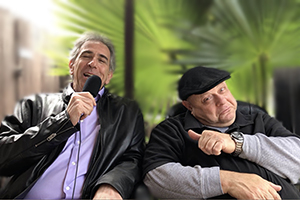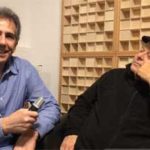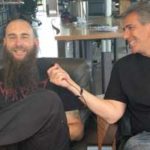Multiple Grammy and Emmy winner stays positive after a long, arduous ordeal
July 1, 2019
Kevin “Brandino” Brandon, winner of over half a dozen Grammy awards, has performed and/or recorded with Robby Krieger, Mary J. Blige, Justin Timberlake, Usher, Outkast, Jesse McCartney, Joss Stone, and countless others. As a TV composer, he has written for Santa Barbara, Gene Simmons – Family Jewels, Pit Boss, The Millionaire Matchmaker, and other shows, earning him three Emmy awards. As a performer, though he is best known for his work as a bassist, he is also an accomplished guitarist.
FBPO’s Jon Liebman paid a visit to Brandino’s Southern California home recently to get caught up on Brandino’s re-entry into the music world after a long, debilitating illness.
FBPO: It’s good to see you looking well and like yourself again. What have you been up to?
Brandino: Well, since I’m recovering from my health crisis, I’m working on several projects. My recovery project is with friends of mine. We’re going to do an album, make some music for the cause, for my recovery, coming back. And I’m going to start a comedy show [Laughs]. It’s gonna be called The Brandino & Momo Comedy Show. That’s one thing I’ve been laughing about, but it’s gonna be good.
FBPO: Tell me about your new record.
Brandino: Well, I was supposed to start a couple years ago, but I couldn’t do it. I couldn’t get out of bed. Between here and going to PT, I wanted to try to do something. A year came and went by. Finally, after almost two years, I was able to do a recovery concert at Santa Monica City College. I kind of twisted my normal direction. I needed to do this project with saxophone and guitar melody lines. That’s one thing that I’m definitely going to pursue besides an actual record of bass stuff. I’m working with two other guys from Warwick, Jeff Hughell and Jacob Ekelman. Jacob was in a metal group with tapping and all that.
FBPO: Jeff plays a 7-string bass, doesn’t he?
Brandino: Yeah! We talked about that ‘cause I’ve got one too. We kind of met in a weird way. I saw him when I did a clinic (and) he did a clinic also, at Bass Player Live! in Hollywood here. I asked him about (his chordal approach to the bass), him being a piano player at one time. I had done an overdub on his solo album, using a black fretless I call the Black Beauty. It’s a Warwick 6-string Streamer fretless, all black. So I woke up one night at like 5:00 in the morning, before I had to do work, and I played this melody, it just came to me. I played it and he said it would work perfectly. “You don’t need to do anything. You hit it. I don’t know how you did it, but you nailed it.” I had to do an acoustic bass over it, so it was like acoustic bass with a tapping metal rock bass, from that kind of timbre. It’s an interesting concept and something I had talked to both of them about doing sometime this year.
FBPO: When you were unable to play during your illness, what part of playing bass did you miss the most?
Brandino: I mean, I couldn’t pick up a bass. I couldn’t even stand up. I was paralyzed, basically, for a year, in a chair. The only bass I could play was the NS (Design) because when I talked to Corey (Redonnett, NS Design Artist Relations Manager), I was in a wheelchair and he put it up to me at Bass Player Live! I went up there and I said, Yeah, okay, I can deal with this because at least I could do exercises. From that transition, it basically was the first situation, and the first instrument I was able to actually start playing in a wheelchair. So at least I kept my hands going. From there, as I was able to stand up, or try to stand up, I finally get to the point where I could get up and walk with two canes and pretty much get to where I needed to go. Now I can basically pick each of the basses that I have, with different combinations of strings in the setup, for either playing classical music or jazz, or a little bit of both.
FBPO: You’ve been playing Warwick basses for a long time. Which Warwick models do you play?
Brandino: The Thumb, Streamers, and single-cuts.
FBPO: What is it about Warwick that made you want to stay with them for so long?
Brandino: They make a great bass! The bottom line, I told Hans (Hans-Peter Wilfer, Warwick founder and CEO), I said, Hans, I know you know about the old country and the Black Forest. If you’re acoustic people, you know that. That’s where they got the wood out of Germany, back in the day. There’s a lot of great basses that were made from that wood. I said, Hans, I’ve got records that I’ve played on. They’re all German basses. I said they sound great, just like the basses you make. [Laughs] It’s the truth! It’s in the wood. So you know, you go with a company that has resources, or wood to make the basses from that region of Germany. I mean how can you go wrong, especially being an acoustic bass player? How can you go wrong playing an electric instrument (made) from that wood, from that same region of the fuckin’ world!
FBPO: I’ve been to their factory in Germany three times and I’ve seen all the different kinds of woods you’re talking about. It’s an amazing place.
Brandino: Hey, that’s what they started doing way back in the day. I mean that’s what they do.
FBPO: What about the rest of your gear? What kind of strings do you use on those Warwick basses?
Brandino: I use D’Addario, either Super Steels or the NYXLs.
FBPO: How about amps and effects?
Brandino: I’m talking with Roland. I showed you that GT-1B. I mean it’s like, you find the setting, freak out, and you know, you can go into your own love/hippie style situation. We were talking about that ‘cause it’s back. The Roland stuff I’ve always liked. For amps, I’ve been using this 2×12 (Gallien-Krueger) combo. I told Forest (Gallien) and he says they’ve been selling a lot of them. And I said, Hey, man, I set it up, I go minus 10, I don’t even pump it up. I make sure to put it about half-way up, they put a DI on. I’m in love ‘cause it’s loud and it carries like a 15, but it’s not overbearing in the hall (not giving the soundman any) problem. Man, I’m serious. I’m sitting there laughing ‘cause the sound is as big as a horse. I mean it’s just like a wall of bass behind me, especially with that pedalboard. I did that on that recovery situation I told you about, at Santa Monica City College.
FBPO: You’ve done a lot of work mentoring people. What can you share about some of the things you’ve observed about people’s bass technique? Are there certain things newer players are getting right, or getting wrong?
Brandino: I think I’ll approach this two different ways. There’s the kids that go to school. They go wherever, NYU, conservatories, or whatever. And they basically get it so when you give them a piece of music, they’ll read it. That’s what they’ve done. Then you got the other kids that don’t have the money, or they don’t have the desire to go that route, and they learn (in) the street. They learn it in church. Those are two different avenues.
FBPO: Is one better than the other?
Brandino: Nah, they’re all the same. I mean basically, a person from either one way or another grabs the other side somewhere in their life, either early or later. As long as they get it there, the balance starts happening because you stop judging yourself. You just accept the music that you like to listen to, or the music you like to play, and accomplish that goal to get to that gig that you’re looking at. Once you do that, the world’s yours. Then it’s for you to figure out what you want to leave for the people coming up after you, desires or information that they can’t find, or whatever. But it’s out there.
FBPO: What else can you share with us about what you have going on or what you have coming up?
Brandino: I’m doing this thing now with a friend of mine, Jeff Edwards. It’s a Spanish project. We got two songs, and they’re real good! So we’ll see how that’s going. We’re kind of working this side situation, and it’s working. And the interest is coming, so that’s all I can say at this point. But the bottom line, it’s looking very favorable.
FBPO: Anything else that you want the people to know?
Brandino: I’m trying to balance life, and the health recovery. I got a lot of stuff on my mind, a lot of stuff I want to get together here, but at the same time my body can only do a certain amount, so I’m making sure I don’t overstep my boundaries. I’m getting better, but I have PT twice a week, still working on my legs. Basically, I’m still to the point that I’m not where I need to be. I need to be able to carry my bass out of this house like I used to, on the back of my shoulder. That’s going to take a minute. But the bottom line is at least I’m having some fun, or trying to have some fun with Robby. I call it the Robby Krieger experience. We had started this project with Ed Roth, Robby Krieger and Franklin Vanderbilt from Lenny Kravitz. It was the first time I was able to play my Warwick 5-string. I call it the Aretha Franklin bass, the booty bass. So, you know, we did that and they recorded it and Robby said, Hey, Kev, I think we got some good stuff here. We’ll see what happens with that. That’ll help. It’ll put a smile on your face, ya know.
See Jon’s blog, with key takeaways from this interview, here.





